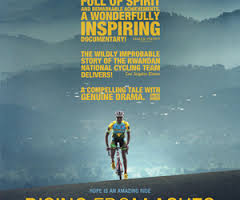
RISING FROM ASHES
US/Rwanda, 2013, 82 minutes, Colour.
Narrated by Forest Whitaker.
Directed by T.C.Johnstone.
Rising from Ashes is an impressive documentary as well moving one. Its focus is on Rwanda and the establishment in 2006 of the cycling team, Team Rwanda.
However, the film gives an outline of the events of 1994, the Hutu genocide of the Tutsi. This outline, spoken by narrator, Forest Whitaker, goes back to the 19th century, German colonial presence, the transition after World War I to Belgian authorities who considered the Tutsi to be more intellectually and culturally advanced than the Hutus and placed them in positions of authority and power. This led to decades of Hutu resentment which boiled over in 1994, April, with propaganda on radio and the media to rouse up Hutus to eliminate the Tutsis. Almost 1,000,000 people were killed in the few months in the middle of 1994, often bludgeoned to death, killed with machetes, with buildings, including churches, burnt. The film indicates some of the consequences – but does not go into the many arrests and trials in succeeding years, of killers, of politicians, of clergy.
The young men of this film were children during the genocide, many being scarred, a number losing parents and extended family.
In the succeeding decade, as these young men became adolescents, a number of them found their skill and their passion in life in bike riding. American cyclist, Tom Ritchie, visiting Rwanda, had the idea to set up a foundation which would encourage the sport, train the athletes, build them up to enter international competitions, and become a focal point for national pride. Ritchie appears in a number of interviews in the film. His main aim was to persuade a friend, former cycling champion, Jock Boyer, to come out of retirement, come to Rwanda (of which he knew nothing, even the genocide, and had to look on the map for its location) and be the coach for the team.
Boyer comes across as a very strong character. But he also mentions that after his cycling success, he behaved inappropriately with a minor and was jailed, finding the jail experience very hard and trying to settle back into life. He is persuaded to go to Rwanda and meets the young men. He is most impressed and takes on the job.
The film features several of the young men, most notably Adrian, who was eventually to go to the 2012 London Olympic Games. Of the initial 15, Boyer wanted to choose a team of five and specialise in training them. We hear them speak of their history, their ambitions, some rather sombre and not speaking English, some rather exuberant, speaking English. It is interesting to note later in the film that Jock Boyer was able to speak in French to the team.
The film takes events year by year from 2007 to the 2012 London Olympics. We see the young men in training, their strengths, their skills with mountain bikes, competitions, challenges, and the strong regime to keep them fit, exercise, meals – as well as the good humour and their working together.
The film keeps up its momentum year by year, showing the team eventually going first to South Africa and then to the United States, active in competitions, learning by experience.
At one stage, competition is held in Rwanda itself, giving the locals an opportunity to see their champions, to focus on them, and to start building national pride in the team.
In the latter part of the film, we see competitors in trials for getting a place in the Olympics, some generosity of team spirit as Adrian’s chain snaps and his partner instantly gives him his bike.
Boyer becomes an engaging personality, as we learn so much about him, see him in action with the group, firm, supportive. And we see the young men over a period of six years growing, changing, achieving.
This is a fine film about the sport which gives a great detail about the cycling itself but also takes us beyond to the human dimension as well as the social dimension in Rwanda, a contribution to building up spirit and national pride after the terrible events of 1994.